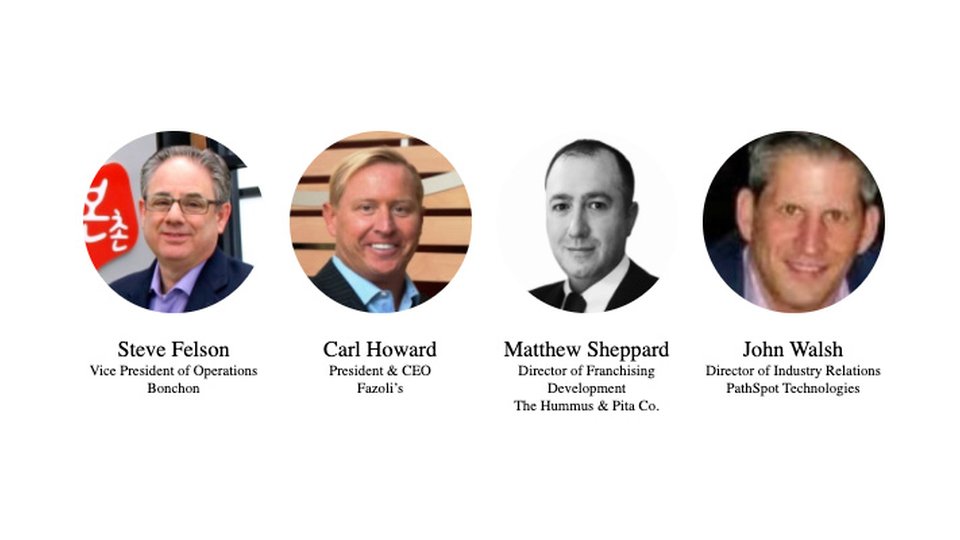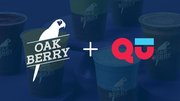Fast Casual Executive Summit
Fast casual leaders talk food safety in the world of COVID-19
Food safety has always been top of mind for every restaurant, but is now even further a priority given the COVID-19 pandemic. Three fast casual brand leaders share tips, insight and strategies for ensuring employee and guest safety.

November 19, 2020 by Judy Mottl — Editor, RetailCustomerExperience.com & DigitalSignageToday.com
Food safety is always top of mind for the restaurant industry, but the advent of COVID-19 has even pushed it higher than ever as the top priority.
Brands are increasing the time, resources and efforts dedicated to food safety and adopting innovative tools and approaches to ensure employee and guest safety. Three fast casual leaders shared their strategies at the recent virtual Fast Casual Executive Summit held in late October.
The event, presented by Networld Media Group, is in its 15th year and "How to Get in the Food Safety Zone," was one of a dozen-plus panel talks during the two-day event.
The session, sponsored by PathSpot Technologies, featured Steve Felson, VP of operations for Bonchon; Fazoli's Restaurants President and CEO Carl Howard; and Matthew Sheppard, director of franchising development for The Hummus & Pita Co. It was moderated by John Walsh, director of industry relations for PathSpot.
Redefining the food safety philosophy
"Safety is paramount to our brand and post COVID it's changed everything as the focus is to exceed customer expectations when it comes to meeting COVID regulations. We need to be on top of everything, monitoring on a daily basis," said Howard, who took the helm at Fazoli's Restaurants Inc. in June 2008.
Over at Bonchon it's safety, safety, safety as well.
"Safety doesn't ever change as it's the most important thing you do in your restaurant and you have to keep employees safe and you have to keep the guest safe. What has changed is the theater. In the past guests gave us credit for things they thought we're doing but now they [guests] want to be sure," said Felson, who spent a significant portion of his restaurant career with Denny's where in his 11-year tenure he served as director of field training and operations support.
"We've taken extra steps, whether it's dine-in pickup, delivery (or) carry out to just show them, 'hey we care.' We're making sure you're safe and I think it's paying in dividends," he said, adding that in May the brand distributed a five-page safety manual relating to COVID-19, and "it's proved really valuable" as the pandemic has raged on for longer than many first thought.
The Hummus & Pita Co is taking the approach of "go safe and show safe," said Howard. "We need to understand the customer journey and how our employees interact with customers and with each other and we illustrate that on a day to day basis," he said.
Technology in play
To drive the safest environment possible, for both guests and employees, Howard said his brand is using technology in several different ways — from taking daily temperature readings of workers to looking into adopting facial recognition tools and temperature scanning for those working in at-home-environments.
"We not there yet but exploring it. We are also pulling down all information from the internet regarding customer feedback given our focus on COVID safety," he said. In that effort the company is getting a daily report on customer feedback via a slew of different search words and phrases such as "safe, dirty, COVID," etc. The technology provides a graph illustrating the comments, locations and times posted.
"That allows us to then coach every morning based on that customer feedback," said Howard.
At Bonchon, Felson's team is tapping centralized data in the quest to share information as quickly as possible.
"We have also readjusted job responsibilities and increased visibility of everything. We've got a tool that allows us insight on everything relating to a specific data point and it's accessible to everyone across all departments to review at any time. It's been very valuable to us," he said.
A top focal point for Hummus & Pita has been deploying tools in regard to the distribution channel and communications with franchise partners.
"We're using a learning management system that helps us create videos and training materials to reinforce safety best practices," said Shephard. "We're looking at ways to better digitize the consumer journey, to reduce touch points and interaction in order to reinforce safety protocols across the board," he added. The brand is actually acquiring new customers through these safety protocols by building up guest confidence in the dining environment.
"It's definitely a time to scale best practices and important to show safety practices in play in regard to consumer journey and employee to employee journey," he said.
At Bonchon, every safety checklist is available to any guest at any time as transparency and showing the brand's safety commitment is key to customer confidence.
"No one's really asked [to see checklists] but I think they appreciate having that opportunity and I think another important nuance is that it's been really important to keep our internal customers happy as employees are just as scared as guests. We really focus on the human side of the business, making customers and employees feel comfortable and tell them what we are doing with safety," said Felson.
"The COVID fear is not the same for everyone. You have to talk to guests, whether it's on phone, online (or) in person and figure out what they need and want in order to feed good. That is half the battle in this pandemic."
At Fazoli's, safety practices are clearly illustrated in two ways. The first are the four sanitation stations set up at each restaurant. The second is a recorded message that runs at the top of each hour at each location. The recording interrupts the usual dining music and lets patrons know that for the next two minutes all employees will be taking a two-minute break to wash hands, sanitize the stations and put on new gloves and masks.
"People like the idea. I would steal it if I were at another brand. It's been a smart way to go," said Howard.
Talk, talk and talk more
All three brand leaders stressed the importance of communication within the safety program strategy. Employees and guests want more information and brands sometimes fall into bad habits, but dealing with COVID requires eliminating all those poor communication habits.
Fazoli's conducted a study on what was working at its locations and what was not in regard to safety and communication. Employees made it clear they wanted to hear and learn more.
"So we set up a 'power hour' on Mondays that offers management and general managers further communication on what's going on," he said.
The key, said Felson, is to understand what needs to be communicated.
"People want information. Don't tell them what you think they want to know, give them an avenue to ask questions. Don't assume what people want to know," he advised, adding the brand has set "happy hours" in which employees can get further communication with management and fellow employees.
In fact, said Sheppard, brands should be over communicating if anything.
"You must have direct lines for questions. Initially it's a bit of a challenge but in the hospitality sector you have to adapt quickly, in a minute," he said.












